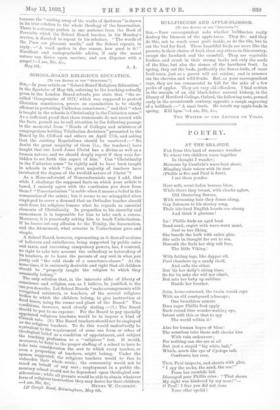SCHOOL-BOARD RELIGIOUS EDUCATION.
[To THE EDITOR OF THE " SPECTATOR."]
.SIR,—In your article on " School-Board Religious Education," in the Spectator of May gbh, referring to the teaching actually given in the London Board-schools, you state that "the so- called Compromise of 1871,' which was supposed to protect Christian consciences, proves on examination to be chiefly efficient in protecting Unitarian consciences ; " and that " what is taught in the schools is Christianity in the Unitarian sense." As a sufficient proof that these statements do not accord with the facts, permit me to call attention to the following passage in the memorial from "Heads of Colleges and ministers of -congregations holding Trinitarian doctrines," presented to the Board by Dr. Clifford and others on April 27th, and asking that the existing Regulations should be unaltered :—" No doubt the great majority of them [i.e., the teachers] have taught that our Lord Jesus Christ has a divine as well as a human nature, and we should deeply regret if they were for- bidden to set forth this aspect of him." Can " Christianity in the Unitarian sense " be rightly said to have been taught in schools in which "the great majority of teachers have inculcated the dogma of the twofold nature of Christ "P As a Nonconformist of Nonconformists may I add, that while I challenge the supposed facts on which your article is based, I entirely agree with the conclusion you draw from them P " Unsectarianism " is noble when it means a belief in the communion of the saints; but it seems to me misapplied when employed to cover a demand that an Orthodox teacher should omit from his religious lessons what he regards as essential -elements of Christianity. In proportion to his sincerity and earnestness it is impossible for him to take such a course. Moreover, it is practically asking him to teach Unitarianism. If he leaves out any allusion to the Trinity, the Incarnation, and the Atonement, what remains is Unitarianism pure and simple.
A School Board, however, representing as it does all sections of believers and unbelievers, being supported by public rates and taxes, and exercising compulsory powers, has, I contend, no right to take into account the orthodoxy or heterodoxy of he teachers, or to leave the parents of any sect in what you justly call "the cold shade of a conscience-clause." At the same time, it is eminently desirable and right that all children -should be "properly taught the religion to which they nominally belong." The only solution that, in the interests alike of liberty of conscience and religion, can, as I believe, be justified, is the 'one you describe. Let School Boards e make arrangements with roognised ministers, or teachers, of the several religious o aies to which the children belong, to give instruction at fixed hours, using the rooms and plant of the Board." Two conditions, however, need clearly stating :—(1.) The Board should be put to no expense. For the Board to pay specially appointed religious teachers, would be to impose a kind of Church rate. religious teachers. The Board teachers should not be employed as • • iuivalent to the eac e.rs. To do this would undoubtedly be theolo e requirement of some one form or other of theological b the t • eaching profession elief as a condition of appointment, and subject moreover, be fatal to h to a " religious " test. It would, take into considerationo t e proper staffing of a school to have to the sect to which every teacher, or -even a proportion system suggested, of teachers, might belong. Under the ggested, th e religious teachers would be free to unburden their whole souls ; the community would not be taxed on behalf of any sect ; employment in a public ele- mentary school would not be dependent upon theological con- siderations ; while all parents would be able to obtain whatever form of religious instruction they may desire for their children. —I am, Sir, &e,, 117 Gough zrms HENRY W. CROSSKEY. Road, B' .ng7tatri, May 8th.


































 Previous page
Previous page